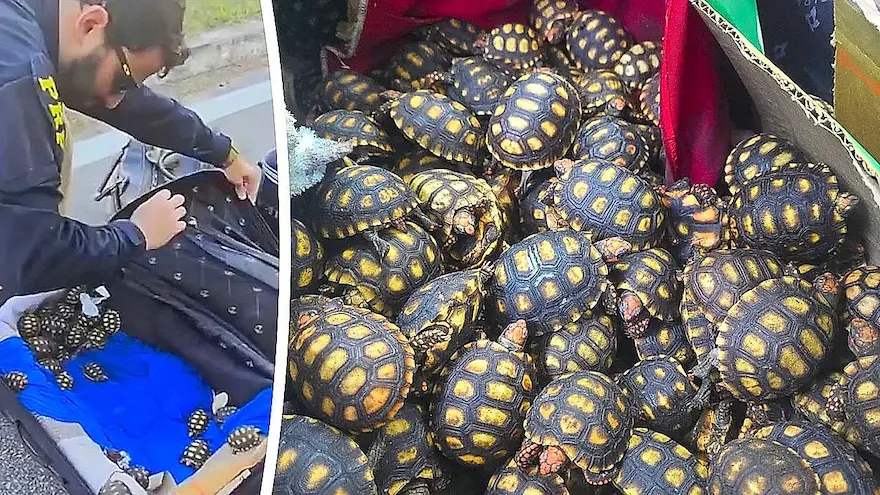
Federal Highway Police discovered 600 baby red-footed tortoises crammed inside suitcases
A Bus Ride of Cruelty: The Discovery That Shocked Teresópolis
Baby Tortoise Trafficking – On July 31, 2025, a routine traffic stop in Teresópolis, Brazil, turned into a grim revelation when Federal Highway Police discovered 600 baby red-footed tortoises crammed inside suitcases aboard an interstate bus. The vehicle was traveling from Feira de Santana, Bahia, to Duque de Caxias in Rio de Janeiro, where the hatchlings were allegedly destined for sale at an open-air market.
Table of Contents
The tortoises, barely weeks old were found in appalling conditions, with many already dead due to suffocation, dehydration, and overcrowding. Officers were stunned by the sheer volume of animals and the callousness of their transport. The suspect, whose identity has not been publicly disclosed, claimed it was his first time smuggling wildlife. However, police records revealed a prior arrest for the same crime in 2015.
Each tortoise was reportedly worth around 700 Brazilian reais (approx. $125) on the black market. Their bright colouring and docile nature make them popular among exotic pet collectors, but their illegal trade is decimating wild populations and fuelling a cruel underground economy.
Wildlife Trafficking in Brazil: A Growing Crisis
Brazil is home to some of the richest biodiversity on Earth and tragically, some of the most active wildlife trafficking routes. The red-footed tortoise (Chelonoidis carbonarius), native to South America’s tropical forests and savannas, is frequently targeted by smugglers due to its aesthetic appeal and adaptability to captivity.
The suspect in this case boarded the bus in Feira de Santana and was intercepted at kilometer 73 of the BR-116 motorway. He admitted to expecting payment for the delivery, and authorities believe the tortoises were headed for illegal sale in Rio’s bustling informal markets.
Under Brazil’s Environmental Crimes Law, unauthorized transport of wild animals is punishable by six months to one year in prison, plus fines. Penalties increase if the crime involves endangered species, occurs during prohibited hunting periods, or is committed within conservation zones.
Despite these laws, enforcement remains a challenge. Traffickers often exploit gaps in surveillance and rely on long-distance buses, private vehicles, and even postal services to move animals across states. The Teresópolis bust is one of the largest in recent years, but experts warn it’s just the tip of the iceberg.
The Toll on Tortoises: Fragile Lives in Transit
The red-footed tortoise is a slow-growing species, with hatchlings requiring specific humidity, temperature, and diet to survive. In the wild, they thrive in leaf litter and underbrush, feeding on fruits, flowers, and fungi. In suitcases, they suffocate.
Veterinarians who examined the surviving tortoises reported signs of stress, dehydration, and shell deformities. Many were too weak to move, and some had already succumbed to the trauma of transport. The fate of the survivors remains uncertain, though they are expected to be transferred to wildlife rehabilitation centers in Rio de Janeiro.
Animal rights groups have condemned the incident, calling for stricter border checks and harsher penalties for repeat offenders. “This is not just a crime, it’s a massacre,” said one activist. “These hatchlings were treated like cargo, not living beings.”
The emotional toll is also profound. Tortoises are known for their longevity and resilience, but their early lives are fragile. When trafficked, they are robbed not only of their habitat but of their chance to grow, thrive, and contribute to their ecosystem.
Fighting Back: Conservation, Education, and Enforcement
Brazil’s fight against wildlife trafficking requires a multi-pronged approach. While law enforcement plays a critical role, experts argue that education and community engagement are equally vital. Many traffickers come from impoverished backgrounds and view animal smuggling as a quick source of income. Breaking this cycle means offering alternatives and raising awareness about the ecological damage caused.
Conservationists are also pushing for better tracking of endangered species and stronger collaboration between states. The use of microchips, DNA registries, and digital permits could help authorities identify trafficked animals and trace their origins.
International cooperation is key. The global demand for exotic pets fuels trafficking networks that span continents. Countries importing tortoises must enforce stricter regulations and crack down on illegal breeders and sellers.
Meanwhile, the Teresópolis case serves as a wake-up call. It’s a reminder that behind every exotic pet sold in a market or online listing, there may be a suitcase full of suffering and a fragile life stolen from the wild.
Also read – Narco Net Crushed: India’s NCB Dismantles Global Drug Syndicate, Wins US Praise